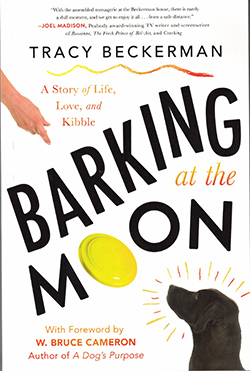Barking at the Moon by Tracy Beckerman; River Grove Books (c) 2021; ISBN 9781632-993939; 200 pages, $15.95.
By Donald H. Harrison

 SAN DIEGO — This memoir more appropriately might have been titled “The Life of Riley,” except for the fact that title was immortalized in the 1940s and 1950s by radio and television actor William Bendix, who portrayed aircraft worker Chester A. Riley on both media. “Riley” in the instance of this book, is a black Flat-Coated Retriever, who remained very much a puppy even well into adulthood. The Beckerman family–which included the author’s husband Joel, son Josh, and daughter Emily — also owned various goldfish, many of whom they collectively named “Larry” (even those who occupied the fish bowl at the same time); a chinchilla; and a bearded dragon (lizard), but Riley was the star and most beloved of all these pets.
SAN DIEGO — This memoir more appropriately might have been titled “The Life of Riley,” except for the fact that title was immortalized in the 1940s and 1950s by radio and television actor William Bendix, who portrayed aircraft worker Chester A. Riley on both media. “Riley” in the instance of this book, is a black Flat-Coated Retriever, who remained very much a puppy even well into adulthood. The Beckerman family–which included the author’s husband Joel, son Josh, and daughter Emily — also owned various goldfish, many of whom they collectively named “Larry” (even those who occupied the fish bowl at the same time); a chinchilla; and a bearded dragon (lizard), but Riley was the star and most beloved of all these pets.
To read Tracy Beckerman’s telling of it, Riley was a one-dog hit squad, demolishing furniture, floors, lawns; and clothing (he particularly liked to chew socks and underwear), and when all that was insufficient to curb his appetite, he somehow taught himself to stand on his hind legs, pressing one to the pedal of the kitchen garbage can, so he could treat himself to whatever was inside.
Such forays were disastrous to Riley’s digestive system, as well as to the olfactory nerves of his owners. But, as any dog owner can tell you, such transgressions are easily forgiven, especially when the canine “perps” look so cute.
Beckerman is an accomplished humor columnist for various newspapers, and many of the episodes related in the book follow a familiar rhythm of a narrative set up, with a leave-them-laughing punchline. For example, one of their pre-Larry goldfish was named Vladimir. Beckerman didn’t want to add Vladimir to the menagerie but her son Josh was so insistent, he offered to buy “pebbles, plants, and other must-have fish tank accessories” for Vladimir to which Beckerman reluctantly agreed. “Vladimir was now one cool sea dude. He was the Big kahuna, the Kingfish, Goldy Dick.”
Unlike previous goldfish which had to be given ceremonial burials at sea (flushed down the toilet, that is) Vladimir continued to thrive, bringing the number of pets in the Beckerman homestead to four. “Ack,” said the mother, who took care of them all. “I can’t stand it.”
“My son smiled. ‘Come on, Mom. Let’s get your mind off it. Wanna play cards?
“Sure. What game?” I asked.
He smirked: “How about Go Fish?”
Ta dum bump.
At another point in the book (one of Beckerman’s friends called it a “dog-oir”), it was decided to give Riley a fitting third birthday party, perhaps in imitation of their friends “who had thrown a Bark Mitvah for their Jewish dog and served kosher kibble while they all yelled ‘Muzzle tov!’ These were the same friends, who also held a bris when their dog got neutered, so I would not be surprised if at some point soon their dog became an atheist too escape all the nonsense.”
In a time when much of the news is depressing (the American pull-out from Afghanistan with attendant loss of life; the continuing COVID-19 crisis; and if you are a San Diegan, the plummeting baseball fortunes of the Padres); Beckerman’s story of “life, love and kibble,” as the book jacket cover put it, is a welcome relief–a bit of escapism, you might say, into the normal chaos of pet ownership.
*
Donald H. Harrison is editor of San Diego Jewish World. He may be contacted via donald.harrison@sdjewishworld.com